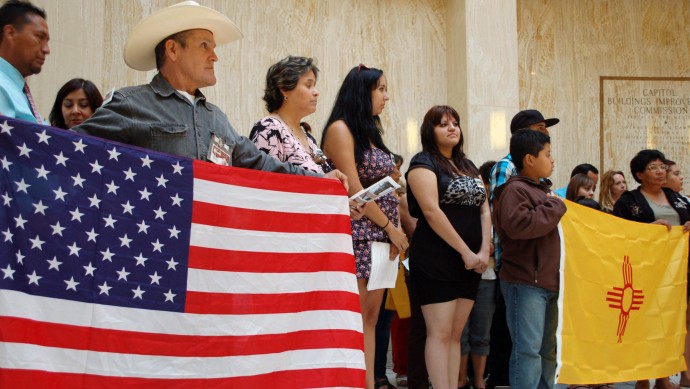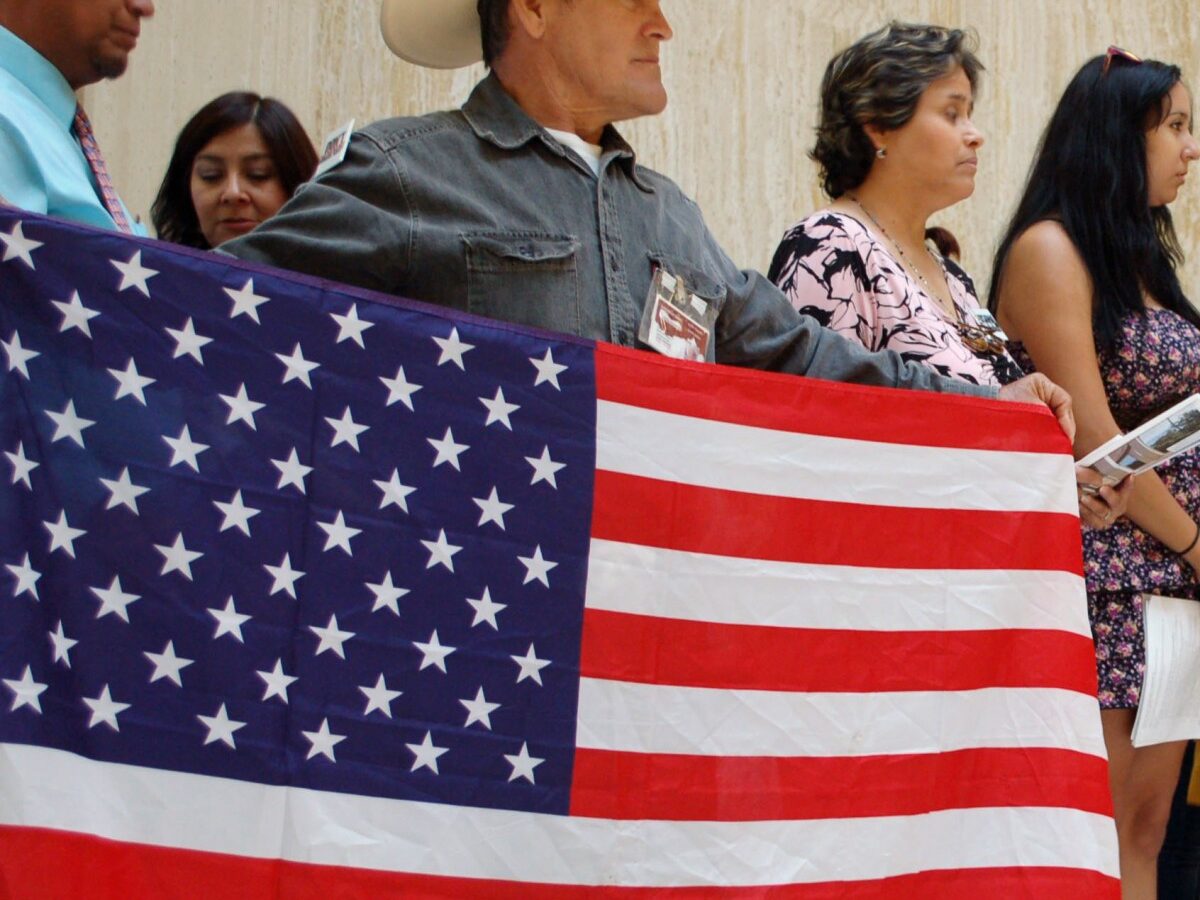
(MintPress) – With President Barack Obama poised to act on immigration reform within the first session of his second term, leaders within the evangelical community are speaking up — not in opposition to the president, but in support of measures that promote amnesty over hard line enforcement and deportation.
Focus on the Family, a leading Christian organization, has been vocal in its support for the reform, creating a political windstorm among the conservative movement.
“We think that people, who have been here for a number of years, who have settled in and started families, ought to be able to come out of the shadows, confess they’re guilty, but not leave the country — unless there are extenuating circumstances,” Focus on the Family senior vice president for public policy, Tom Minnery, said in an interview with MintPress.
It’s a split from the mainstream political line the evangelical community has towed, typically favoring Republican policies in relation to social and economic issues, including abortion and tapering down the debt. Now, leaders are hoping their stance will alter the platform of the party they consider their own.
“Unfortunately it (immigration reform) will be done merely because of the political reality of the election, but I think a number of conservatives are looking at this issue anew,” Minnery said.
A CBS poll taken in March of 2012 indicated that 50 percent of those who voted in the Republican Party primaries belonged to the evangelical, born-again community. Their influence, in turn, is monumental, serving as a voice the Republican Party can’t ignore.
Evangelicals leading immigration reform evolution
Evangelical leaders throughout the nation do not necessarily see themselves as evolving on the issue of immigration — but they are taking it upon themselves to be more intentional in their prayers for a system of reform that focuses less on enforcement and more on compassion and reality.
On Jan. 14, the National Association of Evangelicals (NAE) launched a 40-day prayer challenge, encouraging those within the faith to focus on intended Scripture readings relating to immigration. Titled, “I Was a Stranger,” the series is intended to provoke a spiritual movement within the hearts of evangelicals — one based on compassion.
“We’re starting with the dignity of every being — that’s fundamental — and the importance of family,” NAE Vice President of Government Relations Galen Carey said in an interview with MintPress.
Carey acknowledges the need to also continue border enforcement, but says his organization is encouraging the government to forge ahead with reform rooted in family values, eliminating waiting periods associated with immigration applications that often tear families apart, and considering amnesty for otherwise longstanding immigrant residents.
“What we need to do is fix several things so that the whole system works together,” he said.
That’s something Minnery can agree with. Looking at the issue as a whole, he sees the enforcement of border patrol directly tied to the ability of illegal immigrants to currently get work in the U.S.
Where do evangelicals stand, politically?
A Pew Hispanic Center Survey indicates that just 19 percent of evangelicals supported the president going into the November elections. Their Latino brothers and sisters, spiritually speaking, showed much more support for the president, with 50 percent of respondents to the same survey claiming they’d vote for Obama.
For leaders in the evangelical Christian community, immigration reform is a moral obligation, worthy of escaping political platforms.
“Our mission is to help families thrive and it’s important for families that are caught up in the immigration problems to be able to stay in tact,” Minnery told MintPress. “Current law is such a mess that even those who get in line have a tough time keeping their families together.”
Carey doesn’t necessarily see the viewpoint of the evangelical community as one that belongs to either the right or left, but recognizes that now is the time to forge ahead with immigration reform that promotes dignity and family values. His organization applauds the president in his move to grant temporary work visas to young, undocumented workers, recognizing it not as a solution to the problem, but a step in the right direction.
Carey and his fellow believers think similar amnesty clauses should be extended to benefit not just the young, but people of all ages who have lived and worked in the U.S. as lawfully abiding (illegal status aside) residents. That’s a view that’s shared by Minnery and Focus on the Family, as well.
And while that may have been seen as a radical stance coming from the right side of the aisle just a few years ago, it’s gaining ground.
Even the most vocal of right-wing leaders are changing their tune. Conservative commentator Sean Hannity acknowledged the need for the Republican Party to evolve on the issue, acknowledging a system that doesn’t work and a need to maintain Latino supporters of the future.
His viewpoints gave a glimpse into what’s expected to be an evolved Republican platform, at least when it comes to immigration.
An evangelical movement
Jim Daly, president of evangelical organization Focus on the Family, emerged in 2012 as a supporter of immigration reform — one that takes the focus away from the take-no-prisoners enforcement policies. Instead, Daly has taken a compassionate approach, recognizing the role the immigration issues plays in regard to family security.
“When you look at it, the immigration issue is not just a legal issue,” he said in an interview with Christianity Today. “We respect what needs to be done there and hopefully we can strengthen laws, enforce laws and do all the things that we need to do in that way, because it’s important for a country to establish its borders and maintain its borders. But when you look at the family impact now and the stories we’ve received over the past year or two, it’s pretty tragic what’s occurring.”
While Daly, on behalf of his organization, signed the Evangelical Statement of Principles and Immigration before the election of 2012, it seems there is still plenty of room for change within the evangelical community when it comes to the moral handling of immigration reform.
Christians who consider themselves Born-Again Protestants, categorized in the evangelical Christian folder, are more resistant to immigration reform that favors leniency or conditional pathways to citizenship than they are to straight enforcement.
A Center for Immigration Studies poll shows that 76 percent of Born-Again Protestants support an immigration platform of enforcement — just 12 percent supported conditional legalization. Catholics, on the other hand, had a 64 percent enforcement support rate, with 23 percent in favor of conditional legalization.
The Christian community has plenty of room to grow. Like with anything, leaders emerge as major forces in the evolution process.
The Evangelical Statement of Principles and Immigration, signed by Daly, was also signed by 100 other Evangelical leaders, marking a turn in the way people of that faith will be guided (by leaders) in discussion on the matter. Rather than delving into the politically murky and controversial aspects of immigration reform, the statement instead focuses on six key factors.
The Evangelical Statement of Principles for Immigration includes six major components, most importantly the respect for what the community sees as the God-given dignity of every person. Other aspects of the statement include the protection of the immediate family and a path toward legal status and citizenship for those who qualify and “wish to become permanent residents.”
And while there still are a lot of hearts to change on the issue of immigration, a 2010 Public Religion Research Institute poll indicates that 82 percent of respondents to its survey regarding the Evangelical Statement of Principles said protecting the dignity of every person was of great importance — 80 percent said keeping families together was key. Those are high numbers, yet the same poll indicated that the category considered the most important was promoting national security, with 88 percent, followed by ensuring fairness to taxpayers, with 84 percent.
This shows there’s still work to be done within the hearts and minds of evangelicals on the issue — but leaders like Carey and Daly believe it will happen. With both parties acknowledging that hard line immigration reform doesn’t solve the issue, Carey said now, more than ever, is an opportunity to create change.


